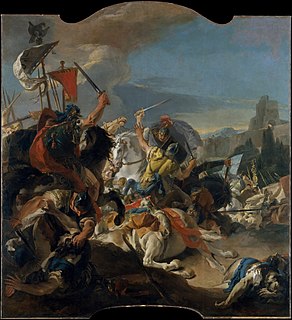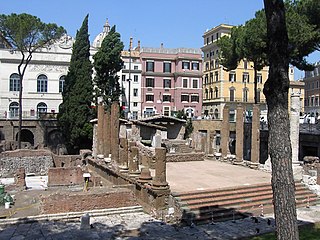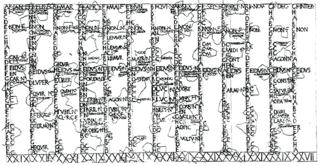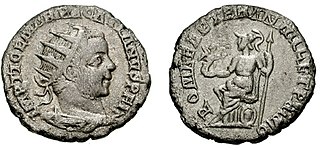
The First Punic War was the first of three wars fought between Ancient Carthage and the Roman Republic, the two great powers of the Western Mediterranean. For 23 years, in the longest continuous conflict and greatest naval war of antiquity, the two powers struggled for supremacy, primarily on the Mediterranean island of Sicily and its surrounding waters, and also in North Africa.
Year 241 BC was a year of the pre-Julian Roman calendar. At the time it was known as the Year of the Consulship of Atticus and Cerco. The denomination 241 BC for this year has been used since the early medieval period, when the Anno Domini calendar era became the prevalent method in Europe for naming years.
Year 102 BC was a year of the pre-Julian Roman calendar. At the time it was known as the Year of the Consulship of Marius and Catulus. The denomination 102 BC for this year has been used since the early medieval period, when the Anno Domini calendar era became the prevalent method in Europe for naming years.
Year 61 BC was a year of the pre-Julian Roman calendar. At the time it was known as the Year of the Consulship of Calpurnianus and Messalla. The denomination 61 BC for this year has been used since the early medieval period, when the Anno Domini calendar era became the prevalent method in Europe for naming years.
Year 78 BC was a year of the pre-Julian Roman calendar. At the time it was known as the Year of the Consulship of Lepidus and Catulus. Later and less frequently, it was known as the year 676 AUC). The denomination 78 BC for this year has been used since the early medieval period, when the Anno Domini calendar era became the prevalent method in Europe for naming years.

Year 77 BC was a year of the pre-Julian Roman calendar. At the time it was known as the Year of the Consulship of Brutus and Lepidus. Later and less frequently, it was known as the year 677 AUC). The denomination 77 BC for this year has been used since the early medieval period, when the Anno Domini calendar era became the prevalent method in Europe for naming years.

Year 220 BC was a year of the pre-Julian Roman calendar. At the time it was known as the Year of the Consulship of Laevinus/Catulus and Scaevola/Philo. The denomination 220 BC for this year has been used since the early medieval period, when the Anno Domini calendar era became the prevalent method in Europe for naming years.
Quintus Lutatius Catulus was consul of the Roman Republic in 102 BC, and the leading public figure of the gens Lutatia of the time. His colleague in the consulship was Gaius Marius, but the two feuded and Catulus sided with Sulla in the civil war of 88–87 BC. When the Marians regained control of Rome in 87 BC, Catulus committed suicide rather than face prosecution.

The Battle of the Aegates was fought off the Aegadian Islands, off the western coast of the island of Sicily on 10 March 241 BC. It was the final naval battle fought between the fleets of Carthage and the Roman Republic during the First Punic War. The better-trained Roman fleet defeated a hastily raised, undermanned and ill-trained Punic fleet, which was a decisive Roman victory as Carthage sued for peace, resulting in the Peace of Lutatius leading to Carthage surrendering Sicily and some adjoining islands to Rome.
Homo novus was the term in ancient Rome for a man who was the first in his family to serve in the Roman Senate or, more specifically, to be elected as consul. When a man entered public life on an unprecedented scale for a high communal office, then the term used was novus civis or "new citizen".

The Battle of Vercellae, or Battle of the Raudine Plain, in 101 BC was the Roman victory of Consul Gaius Marius over the invading Celto-Germanic tribe of the Cimbri near the settlement of Vercellae in Cisalpine Gaul.
The gens Popillia, sometimes written Popilia, was a plebeian family at Rome. The first of the Popillii to obtain the consulship was Marcus Popillius Laenas in 359 BC, only eight years after the lex Licinia Sextia opened that magistracy to the plebeians.

The gens Lutatia, occasionally written Luctatia, was a plebeian family of ancient Rome. The first of the gens to obtain the consulship was Gaius Lutatius Catulus in 242 BC, the final year of the First Punic War. Orosius mentions their burial place, the sepulchrum Lutatiorum, which lay beyond the Tiber.
Quintus Lutatius Catulus, sometimes called "Capitolinus" for his defence of the capital in 77 BC, was a politician in the late Roman Republic. His father was the like-named Quintus Lutatius Catulus, consul in 102 BC.
Aulus Postumius Albinus was a politician of Ancient Rome, of patrician rank, of the 3rd century BC.

The Siege of Drepana took place from about 249 to 241 BC during the First Punic War.

Fortuna Huiusce Diei was an aspect of the goddess Fortuna, known primarily for her temple in the Area Sacra di Largo Argentina at Rome. Cicero lists her among the deities who should be cultivated in his ideal state, because "she empowers each day". She thus embodies an important aspect of time as it figures in Roman religion: every day of the year had a distinct and potent nature, which the public priests were responsible for knowing and aligning the community with by means of the religious calendar.
Quintus Valerius Falto was a Roman politician in the 3rd century BC. Quintus was elected consul in 239 BC alongside Gaius Mamilius Turrinus. He was the brother of his successor, the consul Publius Valerius Falto who served in 238 BC.















